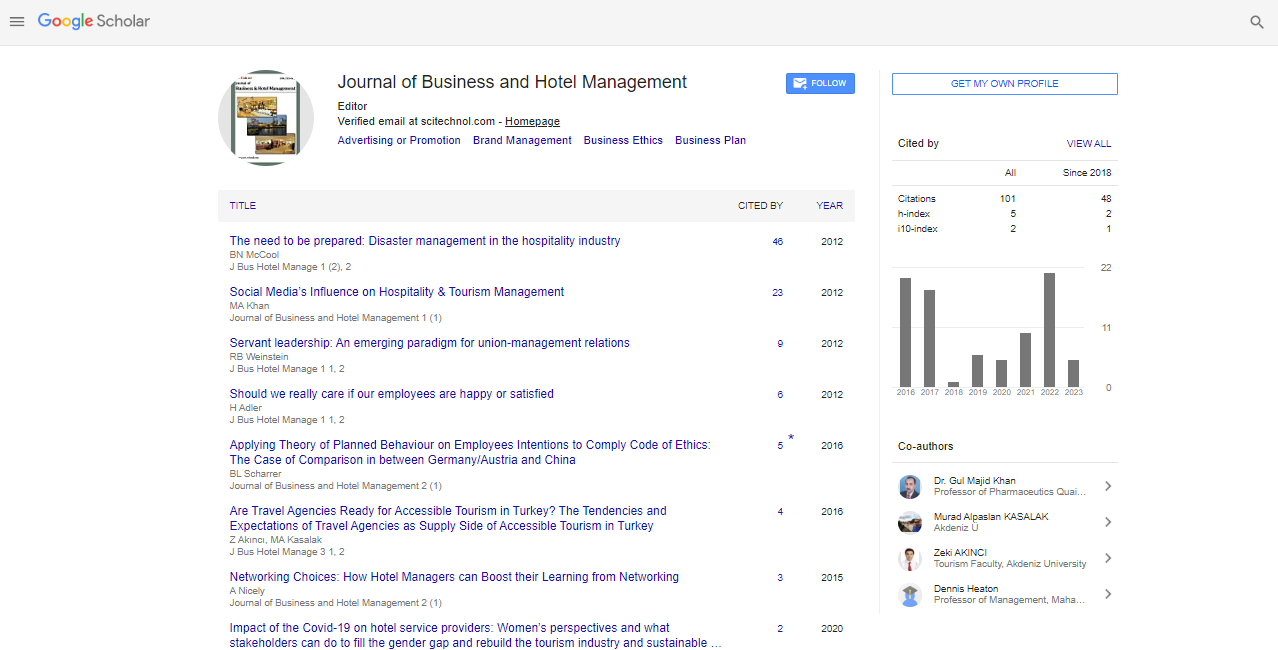Commentary, J Bhm Vol: 9 Issue: 2
Maximizing Profits: The Art and Science of Hotel Revenue Management
Steve Barry*
Department of Marketing, University of Portsmouth, Portland Street, United Kingdom
*Corresponding Author: Steve Barry
Department of Marketing, University of Portsmouth, Portland Street, United
Kingdom
E-mail: barrys64@gmail.com
Received date: 15 May, 2023, Manuscript No. JBHM-23-108146;
Editor assigned date: 17 May, 2023, PreQC No. JBHM-23-108146 (PQ);
Reviewed date: 31 May, 2023, QC No. JBHM-23-108146;
Revised date: 08 June, 2023, Manuscript No. JBHM-23-108146 (R);
Published date: 16 June, 2023, DOI: 10.4172/2324-9129.1000143
Citation: Barry S (2023) Maximizing Profits: The Art and Science of Hotel Revenue Management. J BHM 9:2.
Description
In the dynamic and competitive world of hospitality, hotel revenue management has emerged as an essential strategic practice that enables hoteliers to optimize their profits and achieve sustainable growth. Hotel revenue management involves a systematic approach to pricing, inventory management, and distribution to attract the right customers, at the right time, and at the right price. In this article, we will delve into the key principles and strategies of hotel revenue management and explore how it can significantly impact a hotel's bottom line.
Hotel revenue management is rooted in the idea of selling the right room, to the right customer, at the right price, and for the right duration. It involves the use of advanced analytics, market insights, and forecasting techniques to make data-driven decisions. By understanding demand patterns, seasonal trends, and customer preferences, hoteliers can optimize room rates and availability to maximize revenue and occupancy.
One of the fundamental aspects of hotel revenue management is price optimization. Rather than employing a fixed pricing strategy, hotels dynamically adjust their room rates based on factors such as demand, seasonality, events, and competitor pricing. This dynamic pricing model allows hotels to charge higher rates during periods of high demand and offer discounts during low-demand periods to attract more guests. The goal is to strike a balance between maximizing revenue and maintaining a high occupancy rate.
Effective inventory management is another precarious component of hotel revenue management. It involves carefully controlling the allocation and availability of rooms across different distribution channels. By managing inventory strategically, hotels can ensure that rooms are allocated optimally to the most profitable customer segments while minimizing the risk of overbooking or underutilization.
In the digital age, hotels have a plethora of distribution channels at their disposal. These include their website, Online Travel Agencies (OTAs), Global Distribution Systems (GDS), and various social media platforms. A successful hotel revenue management strategy involves a multi-channel approach that reaches a wide audience while maintaining rate parity and brand integrity across all platforms.
Data-driven decision-making lies at the core of hotel revenue management. Advanced analytics and forecasting techniques enable hoteliers to predict demand patterns accurately, allowing them to optimize pricing and inventory management effectively. By analyzing historical data, market trends, and customer behavior, hotels can gain valuable insights that drive revenue-enhancing strategies.
Hotel guests come from diverse backgrounds and have varied preferences. Effective revenue management involves segmenting customers based on factors such as travel purpose, booking behavior, loyalty, and demographics. By understanding customer segments and their willingness to pay, hotels can tailor offers and promotions to target the most profitable groups.
The length of stay plays an essential role in hotel revenue management. Encouraging longer stays through package deals, loyalty programs, or special offers can significantly impact a hotel's revenue. By strategically managing the length of stay, hotels can increase occupancy rates and improve overall revenue.
Group bookings and corporate contracts are vital sources of revenue for many hotels. Revenue managers need to strike a balance between accommodating these bulk bookings and maximizing revenue from other customer segments. Offering competitive rates and negotiating contracts with corporate clients can lead to long-term partnerships and steady revenue streams.
Seasonal fluctuations and special events can have a significant impact on hotel demand. Revenue managers must proactively plan for such periods, adjusting room rates and inventory to capitalize on increased demand. Whether it's a major conference, a local festival, or a holiday season, hotels can leverage these opportunities to boost revenue.
Conclusion
Hotel revenue management is a multifaceted discipline that requires a combination of data analysis, strategic thinking, and market awareness. By adopting a comprehensive revenue management strategy, hotels can optimize their pricing, inventory, and distribution to maximize profitability and achieve long-term success. In an increasingly competitive hospitality landscape, revenue management remains a vital tool for hotels to thrive and prosper in the face of ever-changing market dynamics.
 Spanish
Spanish  Chinese
Chinese  Russian
Russian  German
German  French
French  Japanese
Japanese  Portuguese
Portuguese  Hindi
Hindi 